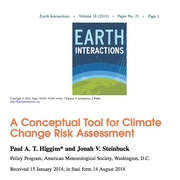ABSTRACT: This study develops a new conceptual tool to explore the potential societal consequences of climate change. The conceptual tool delineates three quasi-independent factors that contribute to the societal consequences of climate change: how climate changes; the sensitivity of physical systems, biological resources, and social institutions to climate change; and the degree of human dependence on those systems, resources, and institutions. This conceptual tool, as currently developed, is not predictive, but it enables the exploration of the dependence of climate change risks on key contributing factors. In exploring a range of plausible behaviors for these factors and methods for their synthesis, the authors show that plausible assumptions lead to a wide range in potential societal consequences of climate change. This illustrates that the societal consequences of climate change are currently difficult to constrain and that high-consequence climate change outcomes are not necessarily low probability, as suggested by leading economic analyses. With careful implementation, this new conceptual tool has potential to increase public understanding of climate change risks, to support risk management decision making, or to facilitate communication of climate risks across disciplinary boundaries.
or
